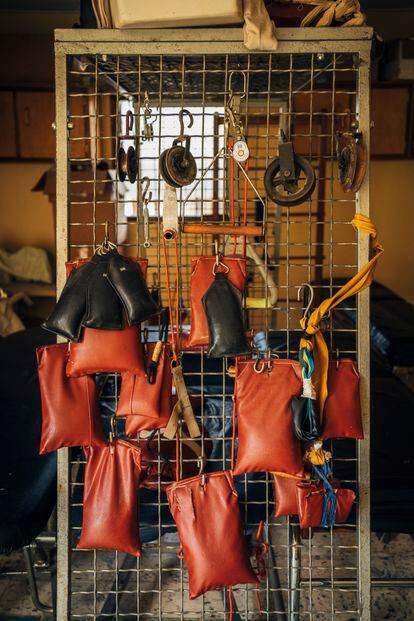Edmond Bruno Akassou Gbamo has a difficult job that he spices up with a sense of humor so as not to break down every day. The 47-year-old is the physiotherapist for Buruli ulcer patients at the Saint Michel de Zoukougbeu hospital in Ivory Coast. Through his hands pass patients with this neglected tropical disease whose skin, muscles and tendons are literally eaten away by a bacteria until the bone is visible. Although the progression of the infection can be stopped with antibiotics, the consequences it has caused will remain. Akassou's job is to ensure that the disability is as little as possible.
“As there is no rule about when to start rehabilitation, I am also in charge of treating very extensive wounds to assess when to start,” he explains after removing the bandage from a patient, cleaning the injury, spraying it with iodine, and covering it with Vaseline. and a clean bandage. “When I see that joint mobility must be achieved because the damage affects tendons, nerves and bone, I put an orthosis on them.” [prótesis externa]”, Add.
Orthoses, which help patients keep their limbs in a certain position, are expensive. That's why Akassou makes them himself, just as physiotherapist Fabrizio Bonifacio taught him almost two decades ago. “I buy the materials in Abidjan. An aluminum bar costs about 20,000 FCA (30.5 euros) and with the war [de Ucrania] It has become more expensive, so I recycle more than before,” he details.
Sitting on a stool with wheels, Akassou moves around the rehabilitation room of the Zoukougbeu hospital, looking here and there for the necessary materials so that the patient he is caring for, a boy of about 10 years old, can carry his arm and hand supported on a fixed support, but with bent fingers. The objective, the specialist says calmly while the little one screams and two huge tears run down his cheeks, is for him not to lose the mobility of his phalanges. The bacteria reached the tendons in the wrist and although it is no longer present in his body, it is necessary to minimize the damage it has caused.
“I feel suffering because that is what I see, their suffering,” acknowledges Akassou, who is already counting down the years he has left until he retires. “13 to retire at 60.” He has been doing this work for 17 years, since he realized that his profession as a musician was not enough to survive; He was no longer so young and wanted to start a family, he specifies. For this reason, this resident of Zoukougbeu went to the hospital to try his luck and apply for a job “anything.” Initially he was rejected, but soon the opportunity opened up. The center needed to train a physiotherapist specialized in patients with Buruli ulcer and, although he lacked prior knowledge in the subject, they called him.

“There are not even 200 physios in Ivory Coast,” he continues, without neglecting his patients. He is not qualified, but Bonifacio's training and experience have made him one of the greatest experts in the treatment of those affected by Buruli ulcer. He thus credits it with the fact that he is responsible for the physiotherapy unit of the reference center for this ailment in the Ivory Coast. And today, he trains others in his specialty.
“Before, I didn't have help,” he says, pointing with a gesture of his chin to his partner of just a few months, assigned here by the Ministry of Health. “I knew that neglected tropical diseases exist, but not in my country,” acknowledges the 29-year-old, who previously lived in Abidjan. “I was emotional when I saw the wounds for the first time.”
I feel suffering because that is what I see, your suffering
The room where Akassou has worked for the past 17 years looks more like a torture room than a healing room. The stretcher, of a height that requires a step to climb, is delimited by bars from which hang weights and other utensils that the specialist uses so that the joints of his patients give way, become toned and regain mobility. The process is very painful, judging by the pained faces, lamentations and tears of the patients. Akassou's hums, jokes, smiles and reassuring gestures are intended to act as a painkiller, also for himself.
On one occasion, Akassou recalls, a girl he was treating asked him: “Do you tell your wife that you come to hurt people?” She swallows and continues to gently tease her patients to follow her instructions no matter how painful they are. “The number of children who would be disabled if I didn't do this job,” she cheers up when the suffering around her threatens to take over her judgment. Music also helps her de-stress, she confesses. And cry; but at home and in privacy. “I river here so patients can relax.” The room becomes empty after a couple of hours and, only then, does Akassou relax as well.
You can follow Future Planet in x, Facebook, instagram and TikTok and subscribe here to our newsletter.
#day #physiotherapist #Buruli #ulcer #survivors #Ivory #Coast